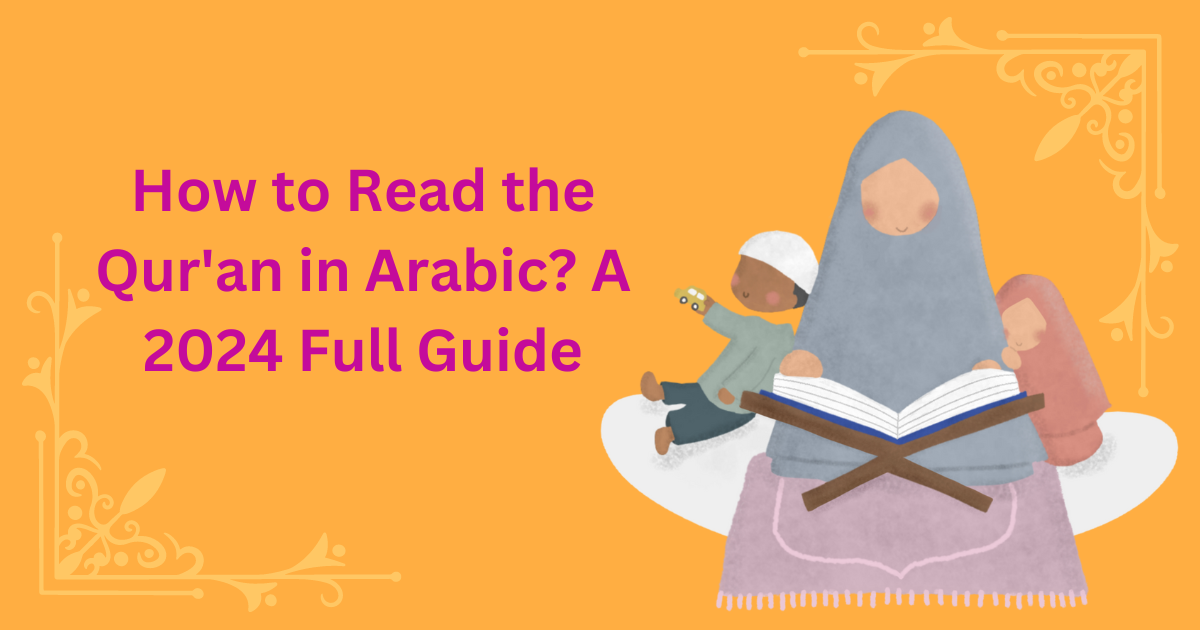Reading the Quran in Arabic is crucial for non-Arab Muslims to truly understand its divine message. While translations help, they lack the depth and spiritual connection of the original text. Overcoming pronunciation and complexity challenges through listening, transliterations, Tajweed, and Tafsir, non-Arabic speakers can fully experience the Qur’an’s profound guidance and rewards.
Actually, to read the Qur’an in Arabic is the major challenge that non-Arab Muslims face, in their journey of learning Qur’an, as it is irreplaceable to read the Qur’an in Arabic; Qur’an is originally revealed in Arabic, so without Arabic, understanding Qur’an will always be incomplete, and incoherent.
They may wonder: ‘why is it not enough, just to understand the Qur’an, through translations, without bothering to learn Arabic, such a weighty, complex language?!’
Before going further, there are crucial points to shed lights on, to answer this question, in the following lines, so keep reading attentively!
Table of Contents
What Does It Really Mean to Read the Quran in Arabic?
Simply, it means reciting the original, Arabic text of the Qur’an- not its translations- exactly as it was revealed from Allah Almighty to the Prophet (ﷺ) through Jabriel.
As Muslims, we are commanded to do so, and even rewarded for each Arabic letter recited; the Prophet (ﷺ):
“Whoever recites a letter from the Book of Allah, he will be credited with a good deed, and a good deed gets a ten-fold reward. I do not say that Alif-Lam-Mim is one letter, but Alif is a letter, Lam is a letter and Mim is a letter.”
Furthermore, reading the Qur’an in Arabic correctly necessitates some needed knowledge like Tajweed, and mastering the Arabic basics, being watchful of its precise terms, purposeful styles and subtle contexts; it is like a big jigsaw puzzles, in which all the pieces fit together meaningfully.
Importance of Reading the Qur’an in Arabic, Not Just Translations?
So crucial is to read the Qur’an in its own language, Arabic, not just relying on any human translations into any other languages. Trust the divine wisdom behind! Let’s discuss the following points together:
1- The Qur’an Is That Original Text Revealed Perfectly in Arabic:
Allah Almighty chose Arabic specially to express His message, commands, warnings, guidance, and reminder to us, as Arabic alone, is the most telling, profound, precise language, on earth, which can reach the depths of our hearts and minds, so that we can get genuinely reminded, and guided, directly by the lights of the Qur’an, with nothing coming in between:
.٢٨قُرْءَانًا عَرَبِيًّا غَيْرَ ذِى عِوَجٍۢ لَّعَلَّهُمْ يَتَّقُونَ
[It is] an Arabic Qur’ān, without any deviance, that they might become righteous.] [Az-Zumar: 27].
وَكَذَٰلِكَ أَنزَلْنَـٰهُ قُرْءَانًا عَرَبِيًّۭا وَصَرَّفْنَا فِيهِ مِنَ ٱلْوَعِيدِ لَعَلَّهُمْ يَتَّقُونَ أَوْ يُحْدِثُ لَهُمْ ذِكْرًۭا
[And thus We have sent it down as an Arabic Qur’ān1 and have diversified therein the warnings that perhaps they will avoid [sin] or it would cause them remembrance.] [Taha: 113].
So, definitely, the original, Divine Message -the Qur’an- can never be replaced by mere human attempts of translations!
2- The Qur’an Is the Ultimate Dhikr for the Soul:
Have you seen these videos where non-Arabic speakers, and even non-Muslims, calm down, once listening to a recitation of the Qur’an in Arabic?! The Qur’an instantly melts their hearts; they feel so captivated, as the Qur’an, in Arabic, goes directly to their souls, even when their minds do not know its language!
إِنَّا نَحْنُ نَزَّلْنَا ٱلذِّكْرَ وَإِنَّا لَهُۥ لَحَـٰفِظُونَ
[Indeed, it is We who sent down the dhikr [i.e., the Qur’ān], and indeed, We will be its guardian.] [Al-Hijr: 9].
ٱلَّذِينَ ءَامَنُوا۟ وَتَطْمَئِنُّ قُلُوبُهُم بِذِكْرِ ٱللَّهِ ۗ أَلَا بِذِكْرِ ٱللَّهِ تَطْمَئِنُّ ٱلْقُلُوبُ
Those who have believed and whose hearts are assured by the remembrance of Allāh (dhikr) . Unquestionably, by the remembrance of Allāh hearts are assured.] [Ar-Ra’d:28].
Reciting the Qur’an, in its own language- not mere the human translations- fills your heart with firm faith, tranquility, and reassurance, as it keeps the bond between you, and Your Creator, by connecting to Him, through His Word, Qur’an.
3- Only Arabic, in the Acts of Worship:
Reciting the Qur’an in Arabic is also a part and parcel of other, daily acts of worship, where we can’t simply read its translations, like salat:
ٱتْلُ مَآ أُوحِىَ إِلَيْكَ مِنَ ٱلْكِتَـٰبِ وَأَقِمِ ٱلصَّلَوٰةَ ۖ إِنَّ ٱلصَّلَوٰةَ تَنْهَىٰ عَنِ ٱلْفَحْشَآءِ وَٱلْمُنكَرِ ۗ وَلَذِكْرُ ٱللَّهِ أَكْبَرُ ۗ وَٱللَّهُ يَعْلَمُ مَا تَصْنَعُونَ
[Recite, [O Muḥammad], what has been revealed to you of the Book and establish prayer (salat). Indeed, prayer prohibits immorality and wrongdoing, and the remembrance of Allāh is greater. And Allāh knows that which you do.] [‘Ankabut: 45].
Abu Hurairah said: “The Messenger of Allah (ﷺ) commanded me to announce that prayer is not valid but with the recitation of Fatihah, and something more.”
4- Reward for the Arabic Recitation of the Qur’an:
For sure, you are rewarded for trying to understand the Qur’an through the explaining translations.
However, the reward of reciting the Qur’an in Arabic, exactly as revealed originally, is still way greater! It is not just for every single Arabic letter recited, like in “Alef Lam meem“, rather it blesses you in this world and the hereafter, too; have a look at those hadiths by the Prophet (ﷺ):
“The one who is proficient in the recitation of the Qur’an will be with the honorable and obedient scribes (angels) and he who recites the Qur’an and finds it difficult to recite, doing his best to recite it in the best way possible, will have two rewards.” [Al-Bukhari and Muslim].
And he also says: “The one who was devoted to the Qur’an will be told on the Day of Resurrection: ‘Recite and ascend (in ranks) as you used to recite when you were in the world. Your rank will be at the last Ayah you recite.”‘ [Abu Dawud and At- Tirmidhi].
Major Challenges for Reading the Qur’an in Arabic, for the non-Arabic Speaker:
For reading the Qur’an, as a non-Arabic speaker, you will find yourself facing some major challenges; yet, every challenge in life can be overcome, so nothing to worry about! Remember, you are still alive, as long as you learn. Let’s see some of those major challenges and how to overcome them:
| Challenges | Solutions |
| 1- Performing the Daily Acts of Worship:In Islam, there are other acts of worship, throughout the Muslim’s day, that necessitate reciting the Qur’an in Arabic, not translated , as Al-Fatihah and other surahs to perform Salat, and certain Ayahs like Ayat Al-Kursi, that is repeatedly needed in the daily dhikr, as well as those other supplications that can be parts of the Qur’anic Ayahs. All those are a must to be read in Arabic, as the original, of course, without delaying, or waiting until completing learning the Arabic language! | 1- Listening More and More, and Utilize Transliteration:Of course, the Muslim can’t miss his daily salats, until finishing his Arabic-learning, whole journey!So, the solution is to read the transliterated versions of the needed Surahs and ayahs, and keep listening to its Arabic recitation as well, so that you can memorize them fast and recite them correctly in salat, for example. |
| 2- The Arabic, Different Alphabetical System, and Pronunciation: Arabic is such a weighty language when it comes to pronunciation, as it has some matchless letters like ض /dh/ that necessitate certain ways of articulation, and intonation that is different from any other language. | 2- Learning Tajweed, Along with Listening to the Right Recitations: Utilize the online, interactive resources to learn how to follow Tajweed-rules when reciting the Qur’an, and Imitate those right recitation of the well-versed Sheikhs. |
| 3- The Qur’an Meanings are Deeper than It Seems! Even the knowledgeable Arabs need to delve into the explanation books, to recognize the message between the lines, so what about those who don’t know Arabic yet?! | 3- Seek the Help of Tafsir: Look for translated explanations in your own language, to comprehend the ayahs you recite, hand in hand with learning the Arabic basics, so that you can grasp the overall meanings, with the help of Tafsir, too. |
| 4- Many, Qur’an-related Studies: The Qur’an is too rich and profound to be understood, word by word, on your own; there are whole heritage and numerous studies reflecting on the Qur’an depths, teachings, and even embedded miracles! | 4- Don’t Rush Yourself to Know All of Them at Once:Start with the most needed Qur’an-studies at a time- like the Qur’anic Arabic, tajweed, and Tafsir; then add more on your learning list once getting ready for the next; that will help you build a good ground to stand on. |
How to Actually Read the Qur’an in Arabic?
Not to be overwhelmed with such long journey of learning, here are some tried-and-tested steps to take, for making your reciting the Qur’an faster and better:
1- Be All Ears, and Repeat:
When you want to read something well, you need first to listen attentively and repeatedly to it; so, you need to be all ears to the well-versed Sheikhs’ recitations of the Qur’an; you can find a plenty of them, online, whether on Youtube, or the Qur’an-recitation apps. Listen and try to repeat after them, more and more.
2- Learn Quranic Arabic Basics:
You need to start learning the Arabic basics, specially the Qur’anic Arabic, with a comprehensive, step-by-step, learning plan, whether through online Islamic, interactive websites, private, qualified tutor, or online, interactive app.
3- Dedicate Time for Practice:
Try to dedicate a certain time daily to practice what you have learned in Arabic, along with what you have listened of ayahs, and actually start to read even a couple of Arabic ayahs, at first, and by the time, add to them gradually.
4- Seek Being Supervised:
Prioritize getting supervised and corrected when reciting the Qur’an, by a Sheikh, or a Qur’an teacher; that will accelerate your learning process!
5- Watch Tajweed Lessons Online:
You can watch many Tajweed lessons online, with charts and explanations, until you can get familiar with the Arabic letters’ right pronunciation, and intonations.
6- Learn in Group:
Try to join a group of fellow learners to keep you encouraged and inspired, and to discuss with them what concerns you have about your recitation, and learn from their recitations, too, whether from their good points, or mistakes corrected.
7- Join Qualified, Qur’an-Learning Academy:
Sign up in one of the trusted, Qur’an-learning, online Academy, like Bayan Academy, as it will guide you all along your journey, and help you to perfect your recitation, and comprehension of the Qur’an , too, from the scratch, till proficiency!
Etiquettes of Reciting the Qur’an:
The Qur’an is the Holy Book of Allah Almighty, and the living miracle, lasting till the Judgment Day, so, undoubtedly, we can’t read it hastily, like any other usual text!
Rather, we should treat it with high respect, reverence, insight, and appreciation, so that we can get blessed with its endless blessings; know what are the etiquettes of Reciting the Qur’an.
How Should a Beginner Start Reading the Quran?
True is that anyone starting a learning journey may feel that it will be a long, rough path to take! Yet, there are always certain, promising ways, and shortcuts to assure you a right track to follow, to reach your aim successfully, without getting drained, or lost, mid-way. Here is the map of how a beginner should start reading the Quran.
How to Read the Qur’an Correctly?
Many may assume that they can recite the Qur’an, in one way or another, but still, with a bunch of mistakes, whether in reading, or comprehending; so, we all always need to check the proper way to make sure that we read the Qur’an right!
Do We Have to Read Qur’an in Arabic?
We’ve already mentioned the importance of reading the Qur’an in Arabic, but is it actually fardh (obligatory)?! Or is it just a Mustahab (preferable)? Here is the answer.
How to Read Qur’an in English?
We all know that the Qur’an is revealed in Arabic. Can we read it in English, too?! How? This is where your question can be simply answered.
Learn to Read Quran for Adults:
A lot of people may feel disappointed that they couldn’t catch the train of learning Qur’an at a young age; Don’t! You will always have the chance to learn the Qur’an, whatsoever your age is! Let me tell you how.
Benefits of Reading Qur’an:
For sure, reading the Qur’an is like discovering endless treasures of benefits! They are so many, yet you can recognize the major benefits.
How Much Reward Do You Get for Reading the Qur’an?
We all know that we are rewarded, when reading the Qur’an, yet we always wonder how much is that reward! As Allah is The Most Generous to give us abundantly.
Learn the Quran Online With Bayan al-Quran Native Arab Tutors:
Embark on a transformative journey of Quranic learning with Bayan Al-Quran’s comprehensive online courses. Our platform offers an authentic and immersive experience tailored to learners worldwide. Whether you’re a beginner or seeking to enhance your skills, our Tajweed courses provide expert guidance and structured learning to master the art of Quranic recitation.
🎓 Expert Guidance:
Benefit from experienced instructors who specialize in Tajweed, breaking down complex rules into manageable segments for learners of all levels.
✨ Key Features:
- Structured, step-by-step learning approach.
- Access to high-quality instructional materials.
- Real-time feedback from qualified tutors to enhance your practice.
- Flexible learning schedules to accommodate your pace and convenience.
- Immerse yourself in the melodious tones of Quranic recitation, enriching your spiritual experience.
🌟 Why Choose Bayan Al-Quran?
Join our vibrant community dedicated to perfecting Quranic recitation. Build a profound connection with the divine words of the Quran and enrich your spiritual journey. Choose Bayan Al-Quran for a transformative learning experience and embark on a path to mastering Tajweed with confidence.
You can also attend online Quran Classes with Bayan al-Quran with Native Arab tutors. There are also several courses that can help you in this regard.
The Conclusion:
Reading the Qur’an in Arabic is essential for non-Arab Muslims to achieve a complete understanding. The Qur’an, revealed in Arabic, contains profound meanings that are lost in translation. Reciting the Qur’an in its original language not only fulfills religious duties but also brings significant spiritual rewards.
Challenges such as unfamiliar pronunciation and complex meanings can be addressed through listening to recitations, using transliterations, learning Tajweed, and studying Tafsir. By following structured learning methods and practicing regularly, non-Arabic speakers can overcome these obstacles and connect deeply with the Qur’an’s divine message.
Non-Arab Muslims face a significant challenge in learning the Qur’an due to its original Arabic text, which is essential for a complete understanding. While translations can help, they can’t replace the depth and precision of the original Arabic, which Allah chose to convey His message.
Reading the Qur’an in Arabic means reciting it as it was revealed, which is crucial for acts of worship like Salat and brings numerous rewards, including each letter recited. Arabic recitation also connects the soul directly to Allah, providing tranquility and reassurance.
However, non-Arabic speakers encounter challenges such as different pronunciations and complex meanings. These can be overcome through listening to Arabic recitations, using transliterations, learning Tajweed, seeking Tafsir for deeper understanding, and practicing regularly.


















